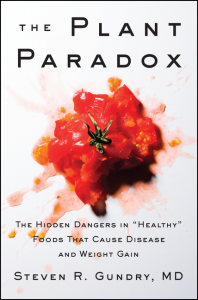 About The Plant Paradox
About The Plant Paradox
• Hardcover: 416 pages
• Publisher: Harper Wave; 1 edition (April 25, 2017)
“Dr. Gundry is a true trailblazer, always at the forefront of scientific knowledge. The Plant Paradox shows the world what pioneer thinking is about and is a must-read book for anyone interested in being as healthy as nature has designed them to be.” —Alejandro Junger MD, New York Times bestselling author of Clean, Clean Gut and Clean Eats
“The Plant Paradox elegantly explains how plants defend themselves from being consumed by humans, and how eating the wrong ones at the wrong times immeasurably hurts our health. An eye-opening read.” —Mehmet Oz, MD, Professor of Surgery, New York Presbyterian/Columbia University
Most of us have heard of gluten—a protein found in wheat that causes widespread inflammation in the body. Americans spend billions of dollars on gluten-free diets in an effort to protect their health. But what if we’ve been missing the root of the problem? In The Plant Paradox, renowned cardiologist Dr. Steven Gundry reveals that gluten is just one variety of a common, and highly toxic, plant-based protein called lectin. Lectins are found not only in grains like wheat but also in the “gluten-free” foods most of us commonly regard as healthy, including many fruits, vegetables, nuts, beans, and conventional dairy products. These proteins, which are found in the seeds, grains, skins, rinds, and leaves of plants, are designed by nature to protect them from predators (including humans). Once ingested, they incite a kind of chemical warfare in our bodies, causing inflammatory reactions that can lead to weight gain and serious health conditions.
At his waitlist-only clinics in California, Dr. Gundry has successfully treated tens of thousands of patients suffering from autoimmune disorders, diabetes, leaky gut syndrome, heart disease, and neurodegenerative diseases with a protocol that detoxes the cells, repairs the gut, and nourishes the body. Now, in The Plant Paradox, he shares this clinically proven program with readers around the world.
The simple (and daunting) fact is, lectins are everywhere. Thankfully, Dr. Gundry offers simple hacks we easily can employ to avoid them, including:
· Peel your veggies. Most of the lectins are contained in the skin and seeds of plants; simply peeling and de-seeding vegetables (like tomatoes and peppers) reduces their lectin content.
· Shop for fruit in season. Fruit contain fewer lectins when ripe, so eating apples, berries, and other lectin-containing fruits at the peak of ripeness helps minimize your lectin consumption.
· Swap your brown rice for white. Whole grains and seeds with hard outer coatings are designed by nature to cause digestive distress—and are full of lectins.
With a full list of lectin-containing foods and simple substitutes for each, a step-by-step detox and eating plan, and delicious lectin-free recipes, The Plant Paradox illuminates the hidden dangers lurking in your salad bowl—and shows you how to eat whole foods in a whole new way.
Purchase Links
HarperCollins | Amazon | Barnes & Noble

About Steven R. Gundry, M.D.
Steven R. Gundry, MD, FACS, FACC, is the director of the International Heart and Lung Institute in Palm Springs, California, and the founder/director of The Center for Restorative Medicine in Palm Springs and Santa Barbara.
Find out more about Dr. Gundry and his work at his website, and connect with him on Facebook.
Tour Stops
Tuesday, April 25th: Jathan & Heather
Wednesday, April 26th: Just Commonly
Wednesday, May 3rd: Art @ Home
Thursday, May 4th: Wall-to-Wall Books
Sunday, May 7th: Dreaming Big
Friday, May 12th: Create With Joy
Sunday, May 14th: Writing and Running Through Life
Saturday, June 22nd: Library of Clean Reads